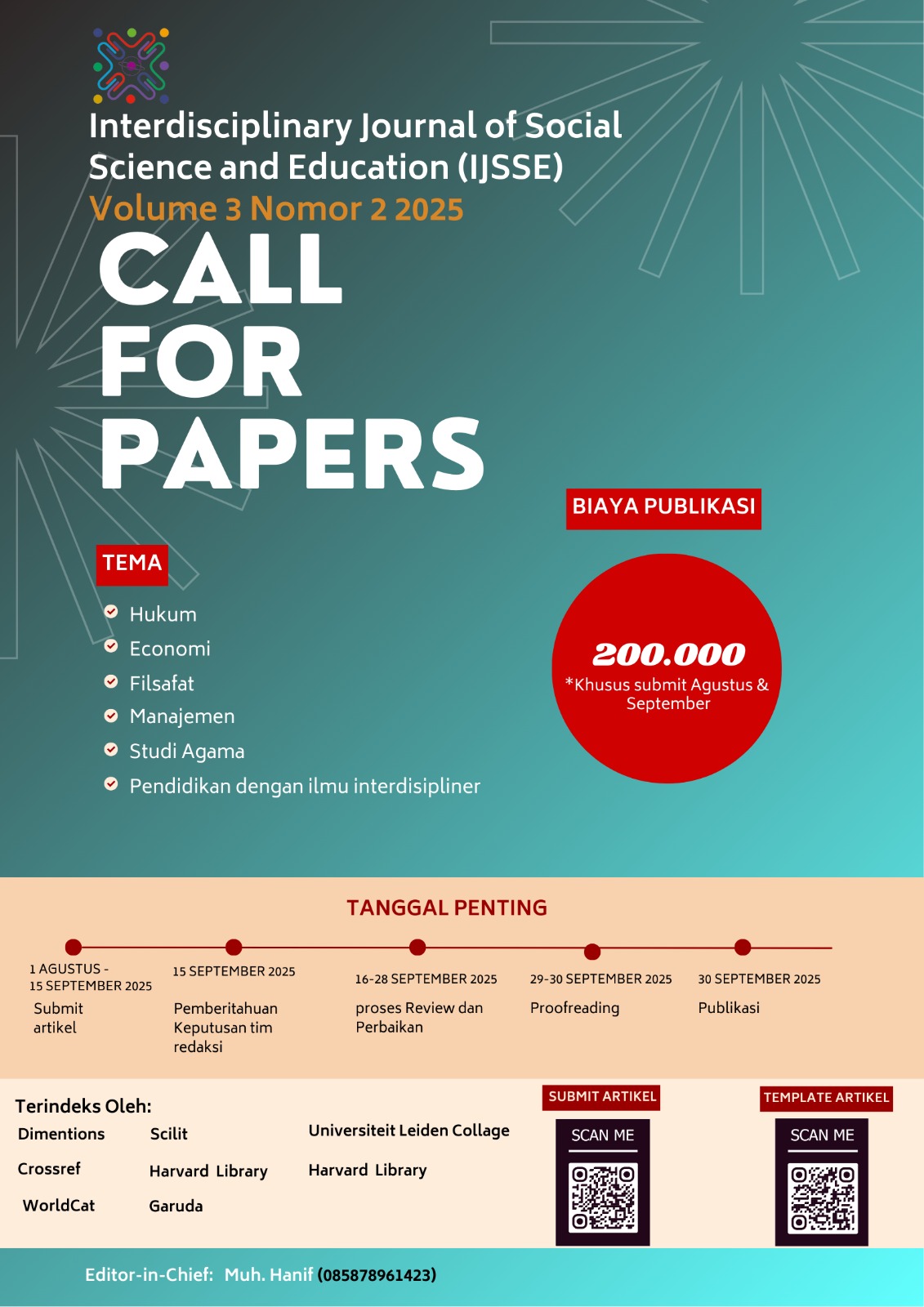Authentic Assessment in the Subject of Islamic Religious Education and Character Education under the 2013 Curriculum
DOI:
https://doi.org/10.53639/ijsse.v3i2.78Keywords:
Authentic assessment, 2013 Curriculum, Religious Education, Character Education, SMP Negeri 1 PurwokertoAbstract
Authentic assessment in the 2013 Curriculum is one of the key components aimed at comprehensively evaluating students' competencies, including cognitive, affective, and psychomotor aspects. Although it aims to provide a more realistic portrayal of students' abilities, this assessment model is often considered burdensome by teachers, particularly in terms of time, instrument preparation, and the complexity of the assessment techniques. This study aims to explore the implementation of authentic assessment in the subjects of Islamic Religious Education and Character Education at SMP Negeri 1 Purwokerto, a pilot school for the 2013 Curriculum. The study adopts a qualitative approach with a descriptive method, gathering data through interviews, observations, and documentation. The results show that authentic assessment at SMP Negeri 1 Purwokerto is carried out systematically through planning, implementation, and reporting stages. In the planning stage, teachers develop lesson plans that include indicators and assessment instruments aligned with the competencies to be achieved. In the implementation stage, assessments are conducted using various techniques such as observation, assignments, and practical exercises, tailored to the characteristics of the material. Reporting of assessment results is done both manually and electronically through the e-Rapor application. This study provides a deeper understanding of the challenges and solutions in the implementation of authentic assessment, as well as its implications for teachers and schools in implementing the 2013 Curriculum.
Downloads
References
Abdillah, F. M., Sulton, S., & Husna, A. (2021). Implementasi penilaian autentik dalam kurikulum 2013. Jurnal Kajian Teknologi Pendidikan, 4(1), 41–50.
Ambarwati, N. (2017). Analisis Penggunaan Penilaian Autentik dalam Pembelajaran Pendidikan Pancasila dan Kewarganegaraan pada Kurikulum 2013 Revisi Kelas X di SMA Negeri 1 Kartasura Tahun Ajaran 2016/2017.
Astuti, E. T. (2017). Problematika implementasi penilaian autentik kurikulum 2013 dalam pembelajaran Pendidikan Agama Islam di SD Negeri Ploso I Pacitan. Al-Idaroh: Jurnal Studi Manajemen Pendidikan Islam, 1(2), 18–41.
Hayati, C. P., Halim, A., & Yusrizal, Y. (2016). Pengembangan Dan Implementasi Perangkat Penilaian Otentik (Authentic Assessment) Dalam Pembelajaran Fisika di SMA N 4 Banda Aceh. Jurnal Pendidikan Sains Indonesia, 4(2), 6–12.
Isnaeni, I. F. (2019). Authentic Assessment in SMP N I Purwokerto.
Documents of SMP N 1 Purwokerto, (2019).
Kunandar. (2015). Penilaian Autentik (Penilaian Hasil Belajar Peserta Didik Berdasarkan Kurikulum 2013) : Suatu Pendekatan Praktis Disertai dengan Contoh. Rajawali Pers.
Pendidikan, K. (2013). Konsep penilaian autentik pada proses dan hasil belajar. Badan Pengembangan Sumber Daya Manusia Pendidikan Dan Kebudayaan Dan Penjaminan Mutu Pendidikan.
Prasetyo, A. P. B. (2015). Translation of Authentic Assessment into Biology Teaching Learning Design. International Conference on Mathematics, Science, and Education 2015 (ICMSE 2015).
Sani, R. A. (2022). Penilaian Autentik. Bumi Aksara.
Sya’idah, U., & Ismail, Y. (2016). Kemampuan Guru PAI dalam Merencanakan dan Melaksanakan Penilaian Autentik (Studi Kasus Guru PAI di SMA Negeri 53 Jakarta). Jurnal Studi Al-Qur’an: Membangun Tradisi Berfikir Qur’ani.
Downloads
Published
How to Cite
Issue
Section
License
Copyright (c) 2025 Musyafangah, Ida Farida Isnaeni

This work is licensed under a Creative Commons Attribution-ShareAlike 4.0 International License.
Authors who publish with this journal agree to the following terms:
- Authors retain copyright and grant the journal right of first publication with the work simultaneously licensed under a Creative Commons Attribution License that allows others to share the work with an acknowledgement of the work's authorship and initial publication in this journal.
- Authors are able to enter into separate, additional contractual arrangements for the non-exclusive distribution of the journal's published version of the work (e.g., post it to an institutional repository or publish it in a book), with an acknowledgement of its initial publication in this journal.
- Authors are permitted and encouraged to post their work online (e.g., in institutional repositories or on their website) prior to and during the submission process, as it can lead to productive exchanges, as well as earlier and greater citation of published work (See The Effect of Open Access).

















